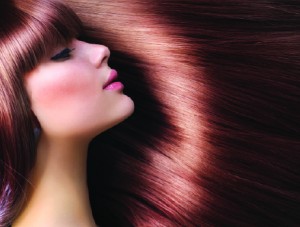By Alan J. Bauman, M.D.
 How often do you think about your hair? For most people, we think about our hair only in terms of how it looks in the morning before we walk out the door, but we rarely give much thought to how everything we do – from our daily habits, to diet and styling – impact the underlying health and resiliency of our hair follicles and cuticles.
How often do you think about your hair? For most people, we think about our hair only in terms of how it looks in the morning before we walk out the door, but we rarely give much thought to how everything we do – from our daily habits, to diet and styling – impact the underlying health and resiliency of our hair follicles and cuticles.
It’s important for people to realize that the hair isn’t just an accessory – just like other parts of the body, such as the skin, bones, teeth, etc., it requires proper care, nutrition and treatments in order to keep it healthy and resilient. While the hair strand itself isn’t alive, the underlying hair follicles are and they need to be kept healthy, or else people will soon find their hair is becoming weak, brittle, dull, thin or even falling out.
1. Take Your Hair Vitamins – It’s important to get enough calcium to support healthy bones and teeth, but did you know it’s also important for your hair follicles? Without the right nutrients, the hair can become limp, weak, brittle and more susceptible to shedding. Eating healthy is important, and so too is avoiding risky diets (such as crash diets) which can ‘shock’ the hair follicles, leading to possible fallout and breakage. Both men and women should try to incorporate a number of key vitamins into their diets which help to boost the hair, such as protein, omega-3 fatty acids, iron, calcium, zinc, biotin and vitamins A, C and B-12. That means eating a healthy diet with plenty of dark green vegetables, whole grains, nuts, low-fat dairy, beans, poultry and salmon. Another option is to take daily vitamin supplements, but the best way is to use professional-grade nutritional supplements specifically designed for boosting the hair, such as Viviscal Pro.
2. Avoid Harmful Behaviors – When it comes to hair, we almost always prioritize styling ahead of health. There are a lot of things we do to our hair which take a heavy toll on the cuticles, strands and underlying follicles and often aren’t noticed until it’s too late. Over-brushing, as well as blow dryers, straighteners and curlers can damage the cuticle, or protective layer of the hair, which results in dry, dull hair that is easily prone to breakage. Over-washing with shampoos can remove natural oils like sebum from the hair which also makes the hair dull and leaves it more vulnerable to breakage. Moderation is the key to preventing damage from everyday styling and cleaning. For instance, unless you have a lot of styling products weighing down your hair, you don’t need to shampoo daily. Another harmful practice that should be avoided altogether is the use of hair extensions. These add weight to the hair shaft and pull on the follicle. This can result in poor hair growth in the short-term and may even cause a type of scarring alopecia (permanent hair loss) in the long-term depending on how frequently and extensively they’re used.
3. Shield Your Hair from Daily Damage– In addition to using moderation when it comes to styling and washing, both women and men should also go one step further by incorporating protective hair products into their daily routines. Heat protectants should be used on the hair, particularly if you’re someone who tends to do a lot of styling with straighteners or curlers. Optimized shampoos and conditioners will also go a long way toward protecting the hair from everyday damage. Shampoos/conditioners that have strong, long-lasting deep conditioners containing ingredients like polyquats, dimethicone and panthenol will help protect your follicles. Additionally, some of the best ingredients to counteract the signs of aging hair and scalp include caffeine, panthenol and niacinamide. Look for hair care products containing these ingredients.
4. Be Proactive with Treatments – At some point in everyone’s life, hair loss is likely to affect them. It could start in a person’s 20s or wait until their late 50s, but eventually most people will experience hair line recession and/or thinning to some degree. It’s estimated that at least 80 million Americans suffer from hair loss, 38% of which are women. Because of this, it’s important for men and women to be proactive about treatments. Anyone who cares about their hair’s longevity should undergo a simple genetic test by HairDX to see whether or not they’re genetically predisposed to hair loss. However, even those who don’t test positive for the hair loss gene can still experience thinning or balding due to medical, lifestyle and environmental factors. It’s important to begin consulting with a qualified hair restoration specialist as early as possible, since once hair loss becomes visible to the naked eye, you’ve already lost up to 50% of the hair follicles. Early action with powerful, preventive treatments is key, and these days both male and female patients have a lot of highly effective medical options available from hair restoration physicians. These include: Formula 82M compounded minoxidil, FinPlus compounded finasteride, low level laser therapy, platelet-rich plasma therapy and artistic NeoGraft FUE transplants.
It’s important for everyone to remember that you need to take care of your follicles and cuticles if you want to have full, healthy hair for the foreseeable future.
Key Nutrients to Boost Your Hair
• Vitamins A and C – Essential for the body to produce sebum. Sebum is an oily substance that’s secreted by hair follicles, sort of like a natural hair conditioner.
• Protein – Keratin, the main structure of the hair fiber is a protein, so getting plenty of protein is important for strong, healthy growing hair. Too little protein can lead to brittle, dull hair.
• Omega-3 Fatty Acids – Important for the scalp to help it support healthy hair growth, omega-3 fatty acids also moisturize your hair from the inside out.
• Biotin – While most people are not deficient in biotin, studies have shown that supplementing with biotin can safely help with hair volume and thickness. Common side effect? Your nails become stronger!
• Iron – Maintaining proper iron levels are key because it helps deliver oxygen to the follicles. Low iron levels can contribute to weak, brittle hair, loss of color and hair loss.
• Zinc – This nutrient helps accelerate cell growth and renewal. Low levels of zinc have been tied to hair loss, thin/weak strands and dryness in the scalp.
• Calcium – Calcium is present in hair follicles, and it’s an important mineral for continuous hair growth.
About Bauman Medical Group Hair Transplant
and Hair Loss Treatment Center in Boca Raton:
• World’s largest stand-alone clinic dedicated exclusively to hair transplantation and the treatment of hair loss in both men and women.
• Located in the heart of downtown Boca Raton at 1450 S. Dixie Hwy
• Amenities and services include ample patient parking, expanded patient care areas, five procedure rooms, four HairCheck Zones and patient lounges, in addition to a conference room, outdoor water features, indoor zen garden, private patient elevator, a oversized lobby/reception area, patient education areas, and more.
• Services offered at Bauman Medical Group Hair Transplant and Hair Loss Treatment Center include NeoGraft FUE no-scalpel/no-stitch hair transplant, LaserCap and other low level laser devices and therapy, Formula 82M compounded minoxidil, HairCheck scientific hair growth/hair breakage measurements, Vampire PRP hair regrowth treatments, FDA- approved Propecia/Finasteride, Eyelash/Eyebrow Transplantation, Hair Transplant Repair, Scar Coverage and Camouflage, and Operation Restore – ProBono Hair Restoration Surgery
Bauman Medical Group Hair Transplant
and Hair Loss Treatment Center
www.BaumanMedical.com
1.877.BAUMAN.9
Check Also
Trusted Homecare Agency: Serving Veterans with Free Supplemental Home Healthcare
When it comes to healthcare, veterans deserve the best care possible. For veterans seeking in-home …
 South Florida Health and Wellness Magazine Health and Wellness Articles
South Florida Health and Wellness Magazine Health and Wellness Articles




